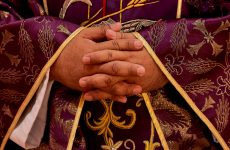Prophecy is a biblical concept that is filled with mystery, mystique, and misconceptions. Some religious leaders these days seem to push the notion way beyond the parameters set in Scripture regarding prophecy. So-called prophets may be found all over the Internet, particularly on social media sites. They claim to speak for God, alleging to be direct recipients of special divine knowledge and revelation.
Prophecy may be divided into two categories: true divinely inspired prophecy and false prophecy. The former of these groups may be divided into two subcategories: (1) foretelling the future, which related to prediction, and (2) forthtelling a word/message from God, which has to do with proclamation.
In the Old and New Testaments we are introduced to several male and female prophets (or prophetesses) of God. Among the Old Testament women prophets are the following leaders: (1) Miriam (Ex. 15:20; Num. 12:2); (2) Deborah (Judges 4:4, 6); (3) Huldah (2 Kings 22:14-15; 2 Chron. 34:22); (4) Noadiah (Neh. 6:14); (5) “the prophetess” (Isa. 8:3). Among the New Testament prophetesses there are the following: (1) Anna (Luke 2:36); (2) Elizabeth (Luke 1:39-45); (3) Mary, the mother of Jesus and other women (Luke 1:46-55; Acts 1:14; 2:17); and (4) Philip’s four virgin/unmarried daughters who prophesied in the early church (Acts 21:9).
The prophet Joel (2:28-29), as cited by the apostle Peter on the Day of Pentecost (in Acts 2:17-18) had predicted, “‘And in the last days it shall be, God declares, that I will pour out my Spirit on all flesh, and your sons and your daughters shall prophesy, and your young men shall see visions, and your old men shall dream dreams; even on my male servants and female servants in those days I will pour out my Spirit, and they shall prophesy.” Peter recognized the powerful, supernatural happenings on Pentecost as the fulfillment of that precise prophecy.
We can read Paul’s instructions to the early church in Corinth regarding the practices and protocol of prophets and prophetesses. First Corinthians 11:4-5 (ESV) says, “4 Every man who prays or prophesies with his head covered dishonors his head, 5 but every wife who prays or prophesies with her head uncovered dishonors her head, since it is the same as if her head were shaven.” Thus, we can clearly see that there were both men and women prophets during the first century church who were filled with the Holy Spirit and “spoke from God as they were carried along by the Spirit” (2 Pet. 1:21).
The prophet Jeremiah established the standard of personal holiness and purity as being a primary test for genuine prophecy (Jer. 23:9–40), as well as whether or not the prophecy was fulfilled in history (Jer. 28:9). Jesus advised his disciples to expose false prophets by pointing to their behavior or “fruits,” referring to the outcome or results of their work (Matt. 7:15–23).
Additional markers for true prophets included the following: (1) They prophesied in the name of the Lord, not in their own name (2 Pet. 1:21); (2) They did not give their own private interpretation of prophecy (2 Pet. 1:20); (3) They pointed out the sins and transgressions of the people against God (Isa. 58:1); (4) They warned the people of God’s coming judgment (Isa. 24:20); (5) They edified the church providing godly counsel and advice in religious matters (1 Cor. 14:3-4); (6) Their words were in absolute harmony with the words of the prophets that preceded them (Isa. 8:20; Gal. 1:8-9); (7) they recognized the incarnation of Jesus Christ (1 John 4:1-3); and (8) They acted in accordance with the will and approval of God (Deut. 18:19).
One of the striking aspects of prophecy in the Bible is its abuse. Out of the approximate forty references in the book of Jeremiah, many have to do with those who have “prophesied falsely” (Jer. 5:31; 14:14; 20:6; 23:25-26; 27:15; 29:9, 21) or who were prophesying lies (Jer. 27:10, 14, 16). In the New Testament, we are also warned of “false prophets” who sought to deceive God’s people. Therefore John warns, “Beloved, do not believe every spirit, but test the spirits to see whether they are from God, because many false prophets have gone out into the world” (1 John 4:1). Peter notes, “But false prophets also arose among the people, just as there will also be false teachers among you…” (2 Pet. 2:1).
The apostle Paul predicted a time following the completion of the inspired, written Word of God (in the first century) that the need for prophecy along with other miraculous gifts of the Spirit would cease in the church (1 Cor. 13:8-13). In the early church, inspired prophets, along with the work of the apostles, evangelists, shepherd and teachers, served to equip believers for work of ministry and build up the body of Christ until unity of the faith (complete body of doctrine) and maturity in spiritual knowledge was achieved (Eph. 4:11-16).
We are blessed to have the completed canon of Scripture at our fingertips that tells us all we need to know “for life and godliness” (2 Pet. 1:3). Biblical prophets served a valuable purpose in communicating God’s scheme of redemption. But they only knew bits and pieces of His greater plan, seeing things dimly. We, however, are beneficiaries to the all-sufficient Word of God and are solemnly warned against either adding or taking anything away from it, lest we be cursed (Rev. 22:18-19).
Dr. Ryan Fraser is an associate professor of clinical mental health counseling at Freed-Hardeman University. His new book, Overcoming the Blues: Finding Christ-centered Hope and Joy through Serving Others, will be released by Skyhorse Publishing (New York, NY) on Sept. 3. For more information, go to RyanNoelFraser.com.
Read or Share this story: https://www.jacksonsun.com/story/news/2019/06/27/power-prophecy/1587621001/


